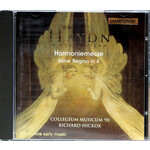
Haydn: Harmoniemesse / Salve Regina in E
 $30.00
Low Stock
add to cart
$30.00
Low Stock
add to cart
JOSEPH HAYDN
Haydn: Harmoniemesse / Salve Regina in E
Collegium Musicum 90, Richard Hickox, with Nancy Agneta, Pamela Helen Stephen, Mark Padmore, & Stephen Vacoe
[ Chandos Chaconne / CD ]
"Haydn's first major work, the Salve regina of 1756, is here juxtaposed with his last, the Harmoniemesse of 1802, so-called because of its exceptionally full scoring for woodwind. The gulf between the two works, in sophistication, mastery and emotional range, is predictably vast. Yet, in their very different ways, both reconcile the formal liturgical conventions of their era with the expression of Haydn's own lifeaffirming religious faith. Hickox and his forces ideally capture this sense of celebratory spiritual energy. Tempos are lively, rhythms alert and vital. In the Mass Hickox generates an exhilarating symphonic momentum in, say, the opening sections of the Gloria and Credo, and, aided by an outstandingly clear, well-balanced recording, realises to the full such dramatic coups as the sudden swerve into A flat in the recapitulation of the 'Benedictus' and the martial fanfares that slew the music from D major to B flat at the start of the 'Dona nobis pacem'. The steely edged valveless trumpets are thrilling here; and elsewhere the wind players do rich justice to Haydn's glorious writing, nicely balancing rusticity and refinement.
Nancy Argenta's innocent, bell-like tones and graceful sense of line are heard to touching effect in the 'Et incarnatus est' of the Mass. In the Salve regina, she also reveals her deft, fluent coloratura technique. No great depths in this youthful work, but Haydn's setting of the Marian antiphon is elegant and affecting, with a command of shapely, Italianate melody and a feeling for dramatic contrast. This is certainly the most memorable work of Haydn's from the 1750s and aptly complements Hickox's fervent, inspiring reading of the Harmoniemesse." Gramophone